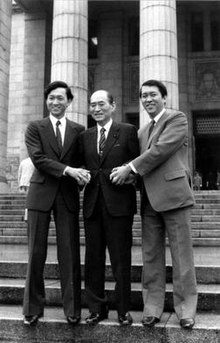

Iichirō Hatoyama
鳩山 威一郎 | |
|---|---|

Iichirō Hatoyama (center) flanked by his two sons, Yukio (left) and Kunio (right), taken at the time when all three were independently elected as members of the Diet of Japan. Iichirō had been in the House of Councilors since 1974; his younger son, Kunio, had been in the House of Representatives of Japan since 1976; and his older son, Yukio, was first elected to the lower house in 1986.
| |
| Minister for Foreign Affairs | |
| In office 24 December 1976 – 28 November 1977 | |
| Prime Minister | Takeo Fukuda |
| Preceded by | Kiichi Miyazawa |
| Succeeded by | Sunao Sonoda |
| Personal details | |
| Born | (1918-11-11)November 11, 1918 Tokyo City, Japan |
| Died | December 19, 1993(1993-12-19) (aged 75) Tokyo, Japan |
| Political party | Liberal Democratic Party |
| Spouse | Yasuko Hatoyama |
| Children | Kunio Yukio |
| Parent | Ichirō Hatoyama |
| Alma mater | University of Tokyo |
| Military service | |
| Allegiance | |
| Branch/service | |
| Battles/wars | World War II |
| |
Iichirō Hatoyama (鳩山 威一郎, Hatoyama Iichirō, November 11, 1918 – December 19, 1993) was a Japanese politician and diplomat. Between 1976 and 1977, he served as Foreign Minister under Prime Minister Takeo Fukuda. He was the son and father of two former Prime Ministers, Ichirō[1] and Yukio respectively.
Hatoyama was born in Tokyo to a high-profile family. He studied at the University of Tsukuba.
Iichirō was a 1941 graduate of Tokyo Imperial University's School of Law; but despite family pressure, he resisted going into law or politics. Instead, he decided to become a public servant; but his plans were interrupted by the Pacific War. He enlisted in the Navy, and was presumed dead when the war ended.[2]
At end of the war, Iichirō was one of 6.6 million Japanese military personnel and civilians who were stranded overseas. At the time, this was about 8 percent of Japan's entire population.[3] These statistics provide a context for understanding what it meant that Iichirō was unable to return home until December 31, 1945.[2]
Iichirō was the eldest son of Ichirō Hatoyama, who was the Prime Minister of Japan in 1955-1956. His grandfather Kazuo Hatoyama was Speaker of the House of Representative in the first Imperial Diet. Despite family pressure, he was interested in building a life outside the arena of Japanese politics; and his sons also grew to become independent-minded men.
Iichirō is the father of Yukio Hatoyama, who was the former Prime Minister, following a win by the opposition coalition in the 2009 elections.[1]
His wife, Yasuko Hatoyama, is a daughter of Shojiro Ishibashi, the founder of Bridgestone Corporation.[4] The couple have two sons. Kunio Hatoyama, like his brother Yukio, may be described as a fourth generation politician [1] and most recently the Minister of Internal Affairs and Communications.
The Hatoyamas have been described in the media as the "Kennedys of Japan".[4]
In 1941, Iichirō joined the Finance Ministry, but this work was interrupted by the Pacific War.
In 1946, he began making a place for himself in the meritocracy of the Budget Bureau. In this work, he caught the attention of men like Takeo Fukuda, who would figure prominently in later life.
In due course, Iichirō was promoted to the position of Deputy Director General in 1963; and he became Director General in 1965.[5] He served as administrative Vice Minister in the Finance Ministry from 1971 to 1972.[1] The position of vice minister is the highest rank in the civil service, comparable to that of "permanent secretary" in the British civil service or "undersecretary" in the civil service of the United States government. The minister is always a politician.[5]
After Iichirō's retirement in 1974, he gave in to long-standing family pressure; and his career in politics began with his election to the House of Councilors (HC) in the Diet.[6]
The capstone of his political career was the period in which he served as Foreign Minister in 1976–1977.[1]
| Political offices | ||
|---|---|---|
| Preceded by | Minister of Foreign Affairs 1976–1977 |
Succeeded by |
| International |
|
|---|---|
| National |
|